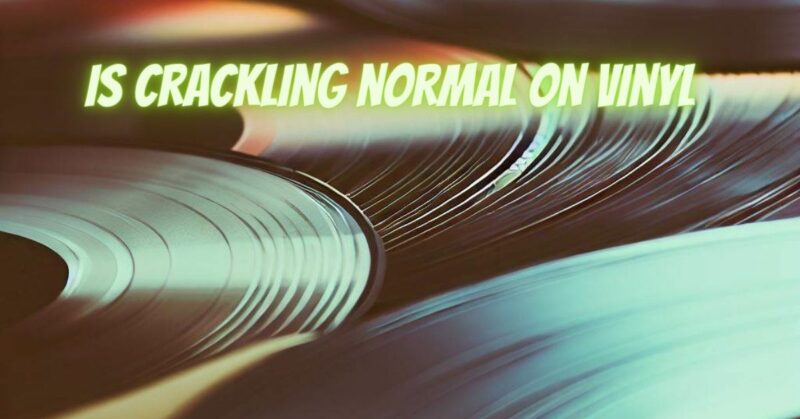Vinyl records have experienced a remarkable resurgence in popularity, captivating music enthusiasts with their analog charm and distinct sound quality. While vinyl’s warmth and authenticity are celebrated, there’s a lingering question that often perplexes both newcomers and seasoned collectors: Is crackling normal on vinyl records? In this article, we will delve into the nuances of crackling sounds on vinyl, exploring the factors that contribute to this phenomenon and providing insights into whether it should be considered a normal aspect of vinyl playback.
The Vinyl Experience: A Symphony of Sound and Imperfections
Vinyl records have a unique character that sets them apart from digital formats. The analog nature of vinyl imparts a warmth and depth to the music that many listeners find appealing. This charm, however, comes with certain imperfections, one of which is the occasional crackling or popping sound that can be heard during playback.
The Factors Behind Crackling Sounds
While crackling sounds are not an inherent feature of vinyl records, they can occur for various reasons, many of which are related to the condition and treatment of the record itself:
- Dust and Debris: Vinyl records are susceptible to accumulating dust, dirt, and microscopic debris. When a stylus runs over these particles, they can create crackling or popping sounds as they disrupt the smooth movement of the stylus.
- Wear and Tear: Over time, vinyl records can experience wear due to repeated playbacks. Scratches, scuffs, and imperfections on the surface of the record can cause the stylus to encounter disruptions, resulting in crackling sounds.
- Pressing Quality: The quality of the manufacturing process plays a significant role. Poorly pressed records with uneven grooves or manufacturing defects are more likely to produce crackling noises during playback.
- Static Electricity: Vinyl records can accumulate static electricity, which attracts dust particles to the surface. When the stylus moves across the surface, these particles can create crackling sounds.
- Storage and Handling: Incorrect storage and handling practices can lead to crackling issues. Records exposed to extreme temperatures, humidity, or direct sunlight can be more prone to crackling during playback.
Is Crackling Normal?
Crackling sounds on vinyl records are not inherently normal, but they are not uncommon either. It’s essential to differentiate between occasional, minor crackling caused by dust or other minor imperfections and persistent, excessive crackling that might indicate more significant issues.
While some degree of crackling can be considered a natural part of the vinyl experience, particularly when dealing with vintage records, modern pressings and well-maintained records should exhibit minimal crackling during playback.
Mitigating Crackling Issues
To minimize crackling and popping sounds during vinyl playback, consider the following steps:
- Regular Cleaning: Clean your records using appropriate cleaning solutions and brushes to remove dust and debris.
- Proper Handling: Handle records by their edges to prevent fingerprints and scratches. Store them in protective sleeves when not in use.
- Quality Equipment: Invest in quality turntables, cartridges, and styluses, and ensure proper setup and maintenance.
- Controlled Environment: Store records in a stable environment away from extreme temperatures and humidity.
In conclusion, crackling sounds on vinyl records are not entirely normal, but they can be encountered due to various factors related to record condition, pressing quality, and playback environment. While minor crackling can be tolerated as part of the analog experience, persistent and excessive crackling might indicate underlying issues that need attention. By taking proper care of your records, investing in quality equipment, and adopting appropriate maintenance practices, you can enhance your vinyl listening experience while minimizing unwanted crackling sounds.


